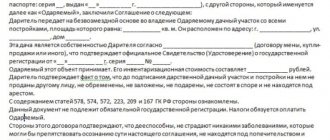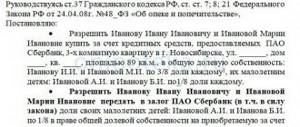Documents on privatization of an apartment: how to get and where to restore
Documents on the privatization of housing include an agreement on the transfer of ownership of the apartment, a certificate of completion of the procedure issued to each person participating in the privatization.
Without them, it is impossible to complete housing transactions. Let's consider the main points of the contract and the privatization certificate, and the features of obtaining these documents. Where can I get samples? Is it possible to change items in them? What to do if privatization documents are lost, and how long will it take to restore privatization documents?
Obtaining documents on the transfer of housing into ownership is the final stage of privatization. They confirm the legality of the procedure and provide grounds for carrying out various transactions. Without them, it is impossible to sell, exchange, or donate living space. Documents must be legal, correctly drawn up, have signatures and seals. Without proper registration, they will not be considered valid.
If the neighbors are against it
Is it possible to privatize a room in a communal apartment without the consent of the neighbors? A special feature of communal apartments is that occupancy in them is carried out on the basis of rental agreements or orders for each individual room .
That is, each isolated premises has a certain circle of people who have the right to use it.
Neighbors in a communal apartment have no relation to each other's rooms. Therefore, a family that decides to privatize their room may not think about whether their neighbors will allow them to do this. You do not need to obtain neighbors' consent for privatization.
Documents on transfer of ownership of an apartment
Where can I get a certificate or how can I find out about the privatization of an apartment? To obtain this data, you can contact the following authorities with the appropriate request:
- Bureau of Technical Inventory;
- Unified state register of rights.
After privatization of an apartment, the following documents are issued:
- certificate of transfer of housing ownership;
- privatization agreement;
- application for the procedure.
Privatization agreement
The privatization agreement is prepared by the bureau providing the relevant services. After this, the owner needs to put his signature on it, and the agreement is sent to the Federal Registration Service. You can get it there. In this case, you need to pay a fee.
The agreement includes the following items:
- indication of address, square footage, number of rooms and other information about housing;
- parties to the agreement (owners and local governments);
- data of privatization participants;
- owner details;
- an indication of the shares for each owner if the share system is used;
- clauses regarding the responsibilities of the parties;
- General terms.
The document is stamped. You can view a sample agreement on any legal website.
A privatization agreement can only be concluded if a number of conditions are met.
- Citizens intending to take part in the privatization process have registration in this housing or reservation of an apartment.
- The right to free transfer of ownership of housing is granted only once, and therefore, if the right to privatization has already been used, an agreement cannot be concluded.
- Possibility of privatization . Not every living space can be privatized; for example, problems may arise with the privatization of a service apartment.
- Participation of all persons registered in the apartment in concluding an agreement on voluntary terms.
Since there is not much time left, the question becomes relevant: is it possible to privatize an apartment with debts on utility bills? The answer is in the previous article.
Certificate of privatization
A certificate of privatization of an apartment can be obtained as follows:
- Order an extract from the cadastral passport of housing from the technical inventory bureau . Before issuing it, the apartment must be inspected by a BTI employee.
- Pay the fee.
- Contact the housing registration center and write an application.
- Get a certificate . The deadline for registering ownership of an apartment in Rosreestr is here.
The document includes the following points:
- the date on which it was issued;
- documents that formed the basis for ownership;
- owner data;
- information about living space;
- cadastral number;
- certificate number;
- seal, signature.
You can view a sample certificate, as in the previous case, on the legal website.
Who has the right to privatize an apartment in 2018?
Do you have the right to free privatization of an apartment in Moscow? In accordance with current legislation, the possibility of privatization of residential premises is possible if:
- You are a citizen of the Russian Federation;
- You live in an apartment under social rent;
- The apartment in which you live is the property of the city of Moscow;
- participated in privatization before
Do you meet these criteria? Congratulations! You have every reason for free privatization of housing.
Document recovery
Sometimes documents confirming privatization may be lost or damaged, but without them it is impossible to carry out transactions. Find out whether it is possible to sell an apartment immediately after privatization on our resource.
If there are no documents, then you should think about restoring them. To carry out this procedure you will need:
- Passports of all persons;
- Funds to pay the fee.
To restore the privatization agreement and certificate, you need to act step by step.
- Find BTI at your place of residence . The address can be found through the official resource of the Bureau of Technical Inventory. The “branch map” section will help you with this. Just click on the link for your place of residence, and you will be able to see a list of BTI available to you. In medium- and small-sized cities there is usually only one bureau. In large cities, there is one BTI per district;
- If the privatization was shared , you must first contact all owners. All homeowners with passports must appear at the BTI.
- It is better to sign up at BTI in advance . In this case, you will save time, since there are usually long queues at the office.
- Appear on time and write an application for a duplicate of the required document . The application indicates the reason for the absence of the original: loss, theft, damage.
- Pay the cost of document restoration . Payment is made through the BTI cash desk or through a bank. The price of the service depends on the region.
- Pick up the document in 1-2 weeks.
Although all privatization documents can be restored, it would be better to ensure that they are in one place to prevent loss. The restoration procedure will take you 2 weeks, and you will have to pay for it. It would be wiser to prevent the problem.
Privatization documents contain standard information: information about living space, owners, and the responsibilities of the parties. A sample agreement or certificate can be found on the Internet. If the standard clauses of the document do not suit you, you can simply supplement it with the necessary clauses.
For additional information on this issue, please see the “Privatization” section here.
Reasons for refusal to privatize an apartment
Inheritance of a privatized apartment is possible only if the privatization procedure is successful. Otherwise, the heir will not be able to assume rights to the inheritance. After the request is submitted, the decision on whether the apartment will be privatized will come in 46 days. If the answer is yes, the procedure continues. But if the answer is negative, you need to find the reason for the refusal and, if possible, remove it.
The refusal comes by mail or online, depending on which form was used when submitting the application. Refusal can occur not only due to incorrectly drawn up documents and errors in them. The reason may be the special status of the premises. For example, an apartment in a hostel, in a military camp, etc. cannot be transferred as an inheritance after the death of the person living there. Also, a refusal will follow if the person has already used the opportunity for free privatization. If he wants to privatize new real estate, he will have to pay for it.
You can get legal assistance on privatization issues on our website.
How to privatize an apartment
Under what conditions can an apartment be privatized?
If you want to privatize an apartment, check whether your situation meets the following requirements:
- you are a citizen of the Russian Federation;
- you occupy residential premises under social rent;
- the residential premises you occupy are the property of the city of Moscow;
- you have never before used the right to participate in privatization on the territory of the Russian Federation (this rule does not apply to those who became the owner of residential premises in the process of privatization before reaching the age of majority);
- you have consent to privatize the residential premises of all adults and minors aged 14 to 18 years who have the right to privatize this residential premises.
What documents are needed to privatize an apartment?
- a request (application) for the provision of a public service - can be completed by an employee during the application (or you can prepare it in advance by downloading the form);
- identification document of the applicant;
- identity document - for all members of the applicant’s family, persons registered in the privatized residential premises, persons who have the right to use this premises on social rental terms, who have reached the age of 14;
- an identity document of the applicant's representative, members of the applicant's family, persons registered in the privatized residential premises, persons who have the right to use this premises under social rent, who have reached the age of 14 (if the documents are submitted by a representative);
- a document confirming the authority of the representative (notarized power of attorney);
- social tenancy agreement for privatized residential premises - a copy of the applicant (except for cases of loss of the social tenancy agreement);
- an order for privatized residential premises or an extract from an order of an executive authority (if the applicant has one); in case of loss of the order - a copy of the order of the executive authority issued by the bodies authorized to provide information from the Archival Fund of the Russian Federation;
- a birth certificate or a document confirming the fact of birth and registration of a child, issued in the prescribed manner (in the case of the birth of a child on the territory of a foreign state);
- document confirming citizenship of the Russian Federation;
- an extract from the house register for the period from July 21, 1991 until arrival at this place of residence or a similar document replacing it;
- a document from an authorized body confirming the unused right to participate in privatization at the previous place of residence;
- a document confirming the authority of the above-mentioned body to issue a document confirming the unused right to participate in privatization at the previous place of residence (a copy certified by the body that issued it);
- written consent to privatization (or written refusal of privatization) of the occupied residential premises of the applicant, a member of the applicant’s family, another person registered in the privatized residential premises, a person who has the right to use this premises on the terms of social rent, who has reached the age of 14, and/or his legal representative or a person authorized in accordance with the established procedure. In this case, a notarized written refusal of privatization must be issued no later than 30 calendar days before the day of application for the provision of a public service.
Important points
The opportunity to privatize a room in a communal apartment requires the following conditions :
- The room is allocated from the total area, has a technical passport, a plan with an explanation in the BTI.
- The room has a separate entrance and is indicated as a separate room in the rental agreement or warrant. For each room, a separate document must be issued confirming the right of tenants to move into it.
- The room complies with sanitary standards and is listed in the documents as living quarters.
Is it necessary to privatize a room in a communal apartment?
What ownership documents are issued after the privatization of an apartment?
According to the Law of the Russian Federation “On the privatization of housing stock in the Russian Federation,” ownership of an apartment or other real estate previously owned by the state passes to the citizen after privatization. Let's look at what documents are issued to citizens when privatizing an apartment and why they are needed.
When buying an apartment, you have to fill out many different certificates and documents. And finally, after numerous efforts and trips to the authorities, the long-awaited apartment becomes yours. But it’s too early to relax, since we have to continue working with the newly received documents.
The main documents that the owner receives in his hands
Until 2021, after the privatization of his residential premises (apartment, house) or plot of land, a citizen received a Certificate of Ownership.
The document confirmed the fact of a transaction between the state or municipality and the citizen. The certificates were issued by Rosreestr. These documents were necessary for any property that was registered by law: for a building, apartment, structure, private house, cottage, land plot. Attached to them was a document containing information on the basis on which the Certificate was issued. After July 15, 2021, Apartment Privatization Certificates will no longer be issued. Emerging and transferring rights to real estate are confirmed only by an extract from the Unified State Register (USRE).
Important! Certificates of privatization of an apartment do not need to be replaced with extracts; these documents are still legal.
The package of documents may also include an apartment purchase agreement, which contains all the necessary points regarding the transfer of rights to the new owner. An apartment transfer deed is drawn up when purchasing a new apartment from the developer. If a citizen participated in shared housing construction, then he must also have the corresponding document.
Which apartments cannot be privatized in 2018?
We recommend that you pay special attention to the fact that the law prohibits the privatization of the following residential premises:
- Dorm rooms
- Apartments in dilapidated buildings;
- Apartments in buildings of closed military camps.
How to properly store title documents
Having received important documents, you should not stuff them somewhere, put them on a shelf or in a table along with other papers. Certificates and documents of this kind must be stored in a safe, secure place (safe, safe deposit box), away from prying eyes.
Important! If the Certificate falls into the wrong hands, you may lose rights to your own property. Do not trust these documents to your friends or relatives, even if they ask you to.
If you decide to sell real estate, provide real estate agents and buyers only with copies certified by a notary. An alternative version of the Certificate, and now the only document confirming privatization, is an extract from the Unified State Register, which any citizen can receive upon request by paying 200 rubles.
An extract is a document that confirms the fact that a given citizen has the official right to property, and there is a corresponding entry in the register. No other papers will be required anymore. The document can be issued to citizens on paper and sent via mail or sent by email.
Important! Do not confuse this extract with an extract about the object and the owner of the property, which is usually requested from Rosreestr during the process of selling or buying an apartment. The second document is publicly available and can be issued to anyone.
If previously, when registering ownership of real estate, citizens were given either Certificates or extracts from the Unified State Register, now there is only one form of document indicating the emergence and transfer of rights to the new owner. After the cancellation of the procedure for issuing privatization certificates, the essence and form of the registration procedure remained unchanged.
What rights does a citizen receive after the privatization of an apartment? After privatization is completed, the citizen becomes the owner of the apartment and can:
- live in an apartment or house,
- rent out housing;
- sell or donate real estate,
- apply for a bank loan secured by an apartment.
What to do after registering the right to real estate
After a citizen has become the owner of an apartment, he will need to notify payment centers and resource supply organizations about this.
After all, it is their services that he will use in the future. So, where exactly should you take the extract from the state register you receive? Documents must be submitted to the Unified Settlement Center so that the apartment is no longer listed as state-owned or owned by another owner. This institution performs the following functions:
- collection of data about owners;
- processing readings from metering devices;
- calculation and accrual of payments;
- printing and delivery of payment slips;
- analysis of payers' claims.
Where else should you go after receiving the extract, which institutions to visit:
- First of all, go to the cash settlement center (CSC), where you will need to write an application to open a new personal account or change the owner’s last name. After all, in the future the new owner will pay for the apartment. RCCs operate as part of the Central Bank and distribute payments for utility services among payers. Each apartment has a personal account assigned to it for transferring funds to service providers. Here they can issue a statement indicating that you are in arrears for rent.
- If a homeowners association has been created in the building where the apartment was purchased, you will need to write an application to be admitted to its membership.
- Register through the MFC or the government services portal at the Federal Migration Service.
- Sign a contract for apartment maintenance with the Management Company.
- Visit your energy supply company. If the apartment was purchased in a new building, then enter into a contract “from scratch.” If the housing is from a secondary stock, then you just need to re-arrange payments.
- With the documents for the water meter, go to the water utility to register. If the new owner of the property fails to appear, this organization may refuse the previous agreements. Penalties may be applied, causing you to pay more for water.
- If you use natural gas, then you will need to visit Gorgaz.
- For a new apartment in a newly built building, you will need to issue a cadastral passport at the BTI or through the MFC, which reflects information about the location, area of the living space, and layout. The cost of the service is 200 rubles, the electronic version costs 150 rubles.
What documents are issued during the privatization of housing?
Obtaining documents confirming the transfer of ownership rights is the main and final stage of privatization.
A stamped confirmation gives full rights to dispose of the apartment.
Without it, you will not be able to sell or exchange it for another option.
Upon completion of the process, you must receive and store two documents in the future:
- privatization agreement;
- extract from Rosreestr.
Next, let's take a closer look at what documents are issued when privatizing an apartment.
Agreement
So, what documents are issued after the privatization of an apartment? The agreement is currently the main document indicating the transfer of housing into private ownership. It contains detailed information about the property and the participants in the process:
- exact location of the apartment, number of rooms and total volume;
- parties to the process – individuals and self-government bodies;
- information about each participant in the process;
- size of shares if a shared ownership system is used;
- a description of the responsibilities and duties of the parties;
- additional terms of the contract.
You can apply for it at the Housing Department of your area by submitting the necessary documents and paying the state fee.
The contract will be valid only if it has your signature as the owner of the apartment.
A stamp from government real estate registration authorities is also required.
In this case, you do not have to have the agreement certified by a notary - a stamp will be enough.
To conclude a privatization agreement, you need to meet several requirements:
- it is necessary to be registered in this housing;
- take part in the privatization of housing for the first time ;
- obtain consent to the procedure from all citizens registered in the housing , who must participate only on a voluntary basis.
When all the documents after privatization of the apartment are in hand, the process is almost complete.
Certificate
According to the decision of the Russian government, from July 2021, owners of privatized apartments will no longer be issued registration certificates. Therefore, the common question “what does the apartment privatization certificate look like?” no longer relevant.
The main confirmation of ownership is now an extract from Rosreestr. This allows you to reduce the level of fraud, because the extract makes it possible to obtain up-to-date information about real estate. Unlike a certificate, it gives precise data regarding a specific date.
You do not need to exchange your certificate for an extract or change any data. You can use the certificate to sell or exchange real estate by attaching it to the package of documents as proof of ownership.
Extract
The extract is confirmation that at the time of its issuance you have ownership rights to a specific property.
In our case - for an apartment.
You can obtain an extract from the Rosreestr branch, which contains detailed information about your apartment and the process of registering it. You can order a statement in both paper and electronic versions.
The real estate registration extract has similar contents as similar extracts that are often requested to verify real estate when purchasing it.
Although it does not have a validity period, it can still be called a temporary certificate, because it confirms the state of affairs only on the date of issue.
How to recover what was lost? Where can I get a duplicate?
There are times when real estate documents are lost or become unusable. For example, you need a certificate of privatization of an apartment, but you don’t know where to get the document. Restoration should be done as soon as possible, because without them you will not be able to carry out any transaction.
This procedure will not require large material costs; all you need is to collect the passports of all participants in the process and have the funds to pay a small state fee.
You don’t have to restore the statement, but simply order a new one. Restoring the contract, like restoring the order, will require a little more effort:
contact the Bureau of Technical Inventory with an application to issue a duplicate.
You will need to indicate the reason for the loss of the original - theft, damage, etc.
You can find the nearest BTI using the official website, which has a section with a map of branches;
pay the state fee , which is the cost of restoring the contract; payment can be made either through the institution’s cash desk or through any commercial bank; The amount of state duty depends on the region of residence;
- obtain a duplicate of the contract ; Recovery time depends on the workload of the center - often it is 1-2 weeks.
Call a lawyer
We will select a specialist for you
8 – Moscow
8 – St. Petersburg
How to find out who participated in the registration of ownership of an address?
There are several ways to find out about the privatization of an apartment and who took part in this process:
submit a request to the Office of the Federal Registration Service at your place of residence;
request an extract from the Rosreestr office , which will indicate all homeowners.
If the apartment was registered before 1998, then you need to request similar information from the BTI;
take an extract from the house register at the passport office , which should have detailed information about the residents registered in the apartment exactly at the time of registration of the property;
Now you know how to check the privatization of an apartment and where it can be done.
Documents for privatization
In order for a privatized apartment to be inherited after the death of the previous owner, it is initially necessary to correctly complete the privatization procedure. A very important point is the collection of documents. There is a minimum set of papers that may be needed to complete the procedure. But they may be asked to supplement it if the executive bodies have any questions.
Before starting the real estate privatization procedure, you must collect the following papers:
- a social rent agreement relating to the apartment that is being privatized (if the original is lost, a new copy can be obtained from the authority where the agreement in question was previously concluded);
- as an alternative to a social contract. for hiring, you can use an order for privatized real estate, but if there is an agreement, it is not necessary to request it;
- certificate of people registered in the premises (issued at the MFC or can be requested on the State Services portal);
- passports of the applicants (all family members who have this document and are registered in the apartment), as well as the applicants’ representative, if you are not submitting the papers in person;
- birth certificates of children registered in the privatized premises or if the child was born in another country (sometimes a death certificate of the person living in the apartment may be required);
- documents proving that the person requesting privatization has Russian citizenship;
- a certificate of non-participation in privatization, if one of the people registered in the apartment refuses their share;
- consent from all adults living in the apartment to privatize the property;
- an application for receiving government services for privatization (you don’t have to write it in advance, but draw it up when submitting documents).
Particular attention should be paid to filling out the application. It is advisable to do this on the spot when serving, since the original forms are used in the regions. If you fill it out incorrectly, the documents will not be accepted.
Useful video
For more information about the abolition of the certificate, see the news video:
Let's summarize. Upon completion of the transfer of property, you should have a privatization agreement and an extract from Rosreestr in your hands.
If you do not know what documents are issued after the privatization of an apartment, contact the Housing Department of the district and the Rosreestr branch. All the necessary papers are issued there.
Certificates of ownership were abolished in 2016, but if you managed to obtain one, you do not need to specifically change it. If you lose your documents, you will need to contact the BTI and pay a state fee.
If mistakes were made when drawing up the contract, then you will have to establish the ownership of the documents through the court.
Is it worth privatizing an apartment in 2018?
Do you need privatization? Let's determine the main pros and cons of privatization of residential premises in Moscow:
Advantages of privatization in 2021:
- You will no longer have to pay for renting an apartment under a social tenancy agreement;
- You will be able to freely dispose of privatized real estate - for example, sell, donate or bequeath an apartment;
- You have the opportunity to make major repairs or remodel your apartment;
- After privatization, you will be able to register and discharge people from your housing at your discretion and virtually without restrictions.
Disadvantages of privatization in 2021:
- You are required to pay an annual tax on a privatized apartment and contributions for major repairs ;
- After privatization, you lose the opportunity to improve your living conditions - if you have your own apartment, you will not be able to obtain ownership of housing for free one more time.
Where to take documents after privatization of an apartment?
According to the Law of the Russian Federation “On the privatization of housing stock in the Russian Federation,” citizens living in municipal apartments have the right to register ownership once in their life. Children taking part in privatization can exercise their right to housing again after reaching the age of 18.
The problem for many residents is the privatization procedure, which requires compliance with a certain procedure and current legislation. How to register real estate for personal use by military personnel, children and other categories of citizens living in municipal houses? These and other questions, including document requirements, can be answered by experienced lawyers of our company and by reading the step-by-step guide in this article.
Housing privatization in 2021 is an open-ended procedure.
Privatization of an apartment in 2021: main provisions
What do you need to know about housing privatization in Russia?
Firstly, the right to privatize an apartment is granted to a citizen only once (the only exception is minor participants in privatization).
Secondly, a mandatory condition for privatization is the consent of all residents of your apartment (including minor family members over 14 years old).
Thirdly, all costs of maintaining a privatized apartment fall on the shoulders of the owners (that is, you will have to not only pay for utilities, but also pay fees for major repairs and property taxes).
Stages of privatization of municipal housing
The procedure for registering a residential property during privatization:
- technical documentation and an apartment plan are prepared - issued to the BTI;
- an extract from the Unified State Register is taken;
- an application is submitted to the district (district) administration with the signatures of all family members or a refusal (certified by a notary);
- a package of documents is submitted (see below);
- an agreement is concluded on the transfer of housing with ownership rights into private hands, which serves as the basis for registration of rights in Rosreestr.
The main stage is to obtain approval of an application for privatization of real estate, which is best done in accordance with all legal norms with the support of experienced lawyers.
Statement
privatization is unlimited, and the application must contain the following points:
- Full name of the applicant, passport details and address of municipal housing;
- an application to transfer the apartment to private ownership, indicating the address, technical data and number of rooms;
- information about the consent of all residents and information about the arrest, pledge of real estate and its primary privatization;
- date and signature with transcript.
This document can be written by hand or you can use the help of MFC center specialists and lawyers.
Package of documents for privatization
Preparing a package of documents is an important stage. State bodies check the papers especially carefully, and if any inaccuracy is detected, privatization will be denied.
What information should you provide:
- application from all family members, including children under 14 years of age (written by the parent/guardian);
- a social lease agreement for real estate, purchase/sale or an order according to the old model, certified by a notary;
- data on primary privatization;
- receipts for payment of housing and communal services to confirm the absence of debt;
- extract from the house register;
- cadastral passport, explication, data on housing redevelopment and other technical documents;
- certificate of family composition;
- Form No. 3 of the Unified State Register of Property Registration (USRN) extracts from all applicants for municipal housing;
- certificate of state (municipal) ownership of the apartment - issued by Rosreestr;
- copies of passports and birth certificates of children, marriage certificates;
- other valuable information upon request.
A complete list of required documents can be found from our lawyers or from the State Budgetary Institution “My Documents”.
Is it possible to privatize a room in a communal apartment?
The main problem with the privatization of housing of this type is the need to obtain the consent of all residents. However, this is true only for those persons who are actually officially registered in the room and does not apply to all other inhabitants of the communal apartment.
A room in a communal apartment has all the signs of a separate home. In particular, a separate entrance. It is most important. At the same time, premises containing a kitchen and a bathroom (as well as any other premises considered common to all residents of a communal apartment (Article 41 of the Housing Code of the Russian Federation)) are not subject to privatization. Thus, a room in a communal apartment can be privatized (Law No. 1541-1), but the inconvenience due to a shared kitchen and bathroom will not go away.
If residents of all rooms of a communal apartment privatize their homes, then they will all be able to submit a collective application for privatization into common shared ownership of common premises, such as the kitchen and bathroom. In fact, this will change little, but it will open up opportunities for redevelopment, reconstruction, and so on.
What to do after privatizing an apartment
At the end of the privatization stage, participants receive a warrant. But the process of transferring real estate at this stage is not complete. The agreement implies that housing is no longer the property of the state, but the tenant cannot fully dispose of it by making legal transactions.
Further actions are registration of real estate after privatization. What you should know:
- You can register ownership through the MFC and the State Registration Chamber;
- after registration there is a final change of ownership;
- selling, exchanging, donating and conducting other transactions with an apartment is possible only after the issuance of a certificate of ownership.
If the owner dies without receiving a title deed, the heirs cannot claim the property. The privatization agreement is not legal and excludes the sale, inheritance and other transactions with housing.
It should also be understood that after obtaining ownership of housing, the copyright holder receives all associated rights and obligations:
- payment for housing and communal services;
- general house needs - maintaining order in common areas;
- cleaning of local areas is at the discretion of residents;
- Internet connection, cable TV and telephone;
- sale, donation, rental of real estate, etc.
In the case of allocation of shares to each owner, all rights apply to each of them in the allocated proportions. Disputes regarding non-payment of bills and other issues are resolved amicably or through the courts.
Deadlines for processing documents
The exact deadline for processing documents for privatization has not been established. It all depends on the situation:
- Preparation of documents by the tenant will take up to 10 days;
- receiving certificates, extracts and copies of documents – 10 days;
- execution of a privatization agreement - without delays of up to 2 months, and with a heavy load on the department - up to 70 days;
- obtaining a real estate certificate – 2-3 months.
Expenses
The housing privatization procedure in 2021 is free, but does involve some costs for documents. How much money will you have to spend?
- state duty – 2 thousand rubles;
- privatization agreement – 1 thousand rubles;
- technical passport of the apartment – 1.5 thousand rubles;
- cadastral passport – 200 rubles;
- USRN certificate (form No. 3) – 200 rubles;
- extract from Rosreestr – 200 rubles;
- notary services – up to 5 thousand rubles;
- power of attorney – up to 3 thousand rubles.
The information provided is not accurate and may change according to the legislative framework and prices in the region.
Summary
The privatization of real estate (apartments and private housing) follows a single scenario. In addition to the standard rules for preparing documents, experienced lawyers recommend paying special attention to some points:
- the privatization agreement and the application must indicate the same housing, which is subsequently subject to re-registration;
- children over 18 years of age and adults whose rights were infringed/violated during a previous transaction have the right to re-privatization (decided in court);
- privatization is a free procedure (except for the costs of documents, certificates, etc.), and if you demand payment at the market value of the apartment, you should file a complaint with the court or administration;
- Children cannot be excluded from the list of copyright holders.
The privatization process is regulated by several Russian laws and legal acts. To eliminate mistakes and go through the privatization procedure within the framework of current legislation, it is better to use the help of qualified lawyers. This will help you quickly collect a package of documents, resolve controversial issues with residents and obtain a certificate of ownership in a short time. You can get a free consultation by calling or asking a question through the form on the company’s website.









